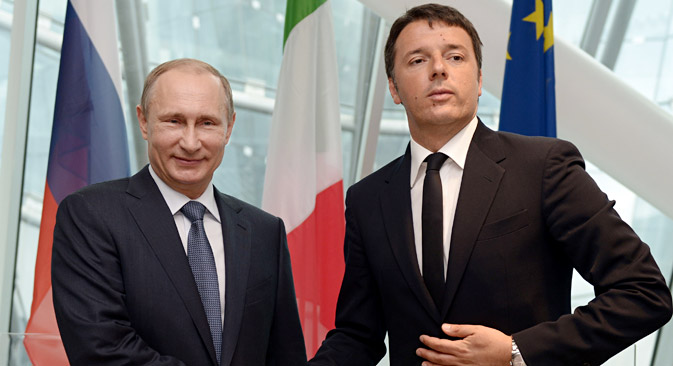
Italian Premier Matteo Renzi with Russian President Vladimir Putin at the end of a press conference at the Expo 2015 in Milan, June 10, 2015. Source: AP
Western sanctions are damaging Russia and a way out of the situation needs to be found, Russian President Vladimir Putin said during an official visit to Italy on June 10 in which he met with senior Italian officials and Pope Francis.
In a day packed with meetings, the Russian leader participated in the opening ceremony for Russia Day at the EXPO-2015 exhibition in Milan and held talks with Italian Prime Minister Matteo Renzi, as well as meeting with President Sergio Mattarella and the pontiff. In the evening, when he was already at the airport, Putin had a half-hour meeting with former Prime Minister Silvio Berlusconi, who is known to be friends with him.
The Russian president had last visited Milan in October 2014, where he had a one-on-one discussion with Ukrainian President Petro Poroshenko on the situation in Ukraine, where government forces remain in a standoff with Russian-backed rebels in the east of the country, and the issue was also high on the agenda during Putin’s latest visit.
At a press conference after the talks, Putin and Renzi confirmed their continued approach to the Ukrainian crisis, underlining that the only way of solving the conflict was through implementing the peace agreement signed in Minsk on February 12.
The meeting with Renzi was not the first for Putin. They had met not so long ago – during the Italian prime minister’s visit to Moscow in March. Renzi was the first Western politician to make an official visit to Russia after the start of the Ukrainian crisis, a move that drew criticism from Washington at the time, according to media reports.
In March, the two leaders said they intended to develop cooperation between Russia and Italy, despite the sanctions imposed against Russia.
Renzi and Putin also discussed the sanctions on this occasion, though according to Putin, the discussion was "not in terms of the abolition or simplification" of the economic measures, but based on how "these sanctions hinder the development of our relations."
The Russian leader mentioned that several Russian-Italian projects that had been frozen due to the sanctions and said that, despite the fact that sanctions were having a positive effect in regard to stimulating the development of import substitution in Russia, they were harmful in general. "We need to find a way out," he concluded.
According to Alexander Konovalov, the president of the Institute for Strategic Assessments, the main objective of Putin's visit was to try to find a way of altering the situation with the sanctions, in what European media saw as an effort to exploit disunity in the ranks of the EU.
"In my opinion, he is trying to break the sanctions regime by all means because it is greatly aggravating the situation in Russia," said Konovalov in an interview with RBTH.
Maxim Bratersky, a professor at the Higher School of Economics in Moscow, largely agrees with this assessment. He believes that Putin's visit to Italy was designed to help solve two problems – to balance the difficult dialogue with the European Union and promote economic projects that do not fall under the net of sanctions.
Moscow is also pursuing a strategy of supporting the voices within the EU that have a softer attitude toward the Russian Federation, Bratersky told RBTH.
According to Bratersky, it makes sense for Russia to continue with this approach, since it is bearing at least some fruit. According to the RIA Novosti news agency, after his meeting with Putin, former Italian Prime Minister Silvio Berlusconi said that members of parliament from his party Forza Italia will offer a draft resolution calling on the authorities to reject the sanctions policy against Russia.
Konovalov believes that the meeting with the Pope was also extremely important for Putin. "The authority of the Pope is very high in the world. Francis is a very popular figure. It [the meeting with the pontiff] will be regarded as an achievement for him [Putin]," he said.
Konovalov believes that the meeting of Putin and the Pope was a "recognition of the need to talk to Russia, and to take account of its opinion and the opinion of its leader," which, the analyst stresses, is especially relevant against the backdrop of sanctions and attempts at the international isolation of Russia.
The meeting with Pope Francis lasted about an hour, twice as long as planned. According to the Russian president's press secretary, Dmitry Peskov, Putin and Francis discussed the situation in Ukraine, as well as the situation facing Christians in the Middle East.
According to Vatican officials, Francis made a call for all parties to follow the Minsk agreements and told Putin that “a sincere and great effort” was required if peace were to be restored in Ukraine. Francis asked the Russian president to assist in guaranteeing access to humanitarian aid groups in the region.
Speaking about the meeting, Peskov also commented on the statement of U.S. Ambassador to the Vatican, Kenneth Hackett. According to the British daily The Guardian, Hackett advised the Pope to raise the question of the territorial integrity of Ukraine at the meeting with Putin. Peskov saw this as an attempt to "teach the Pope," and called it "a new word in diplomatic practice," as well as "a blatant case of an attempt to suppress the sovereignty of other countries."
All rights reserved by Rossiyskaya Gazeta.
Subscribe
to our newsletter!
Get the week's best stories straight to your inbox